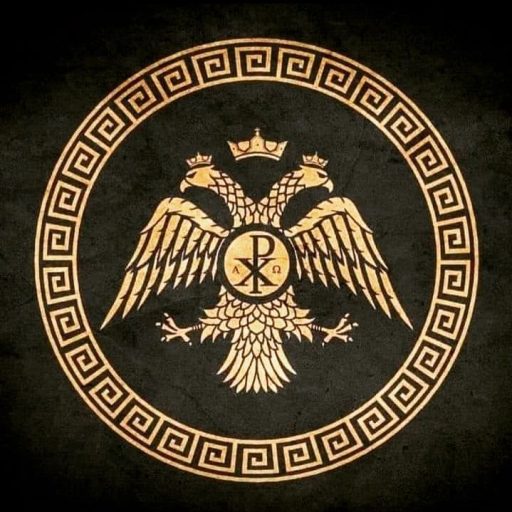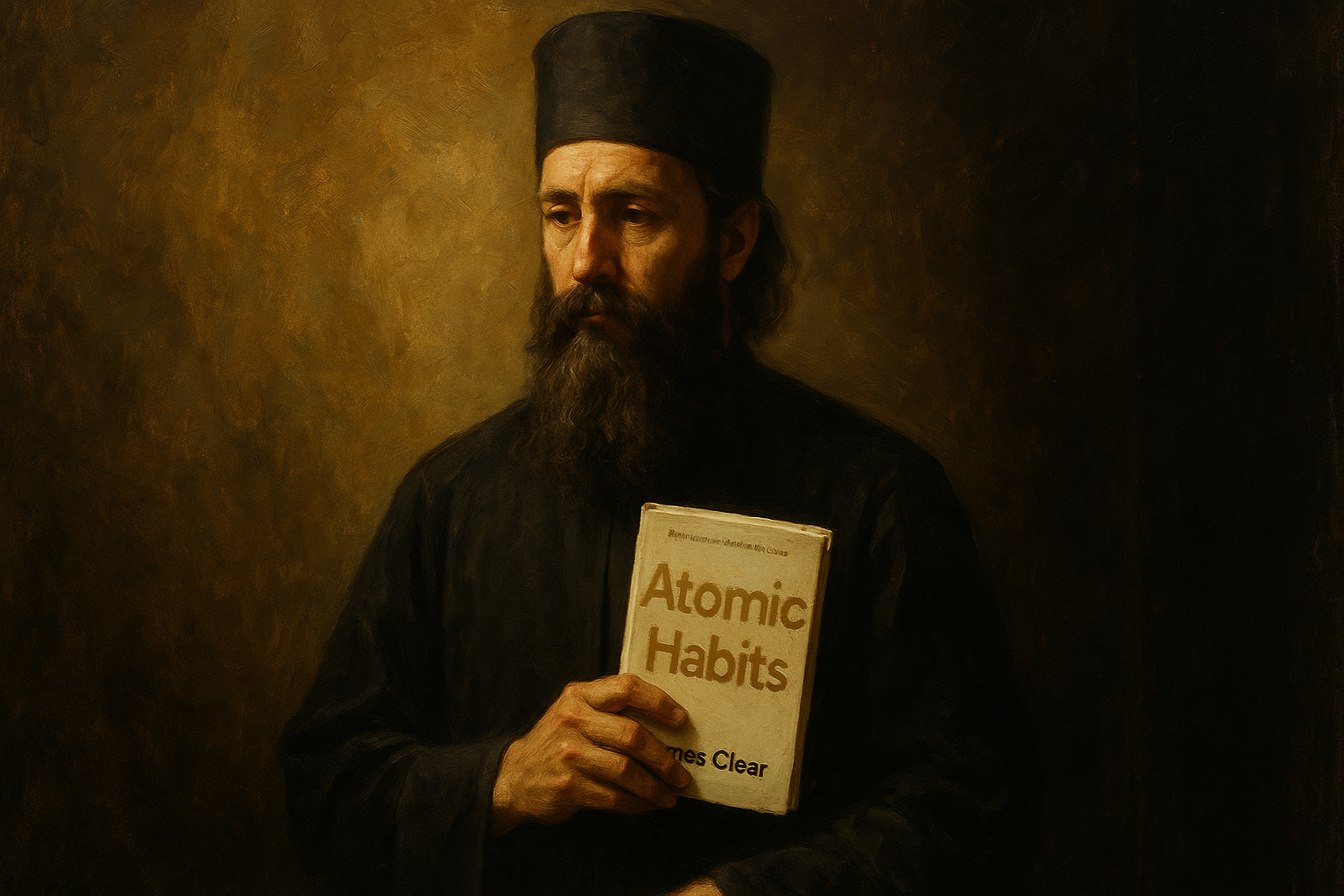In the past, when I used to call myself an atheist I’ve read a decent amount of books on psychology and I studied psychology, manipulation and neuro-marketing.
One of the best books anyone can read is Atomic Habits by James Clear.
The first time I read this books, was years ago, and it helped me a lot fix my schedule, routine and quit bad habits.
Recently, I started re-reading it, and I’ve realized something I would say it’s quite interesting about psychology.
If we follow a dictionary definition of psychology, it is described as the scientific study of the human mind and its functions, especially those affecting behavior in a given context.
We can have an extended conversation about what the human mind is, but from an Orthodox Christian perspective, the side of the human mind studied by psychology is the one linked to our fleshly desires.
Psychology is more about the flaws of our sinful flesh and how they influence us when not being in control.
This not being in control, I would consider being further from God.
To which extent? I don’t know.
Today, in Church during his homily, Father Constantine said that a person who has hatred for even one person, doesn’t know Christ, and ultimately Christ doesn’t know him.
Side Note: “Depart from me, I never knew you” in Greek, if translated word by word, is “Depart from me, I don’t find Myself in you”
The only way we can stop hatred is by being in control, and stopping ourselves when our fleshly instincts kick in.
It’s hard, and it’s the ideal we all must strive to achieve, and the perpetual fight to get there is definitely worth it.
Now, back to being in control and psychology.
Psychology is not about understanding conscience, which is a gift from God only for humans — because we were made in His Image.
Psychology studies strictly the impulsive fleshly nature that controls us, when we fall into sin, or better said that throws us into the spiral of sin.
Most psychological experiments like Edward Thorndike’s Puzzle Box, or Pavlov’s Dog, and many other studies and prove how close we are to animals when not in control.
When we are not purposefully guided by our conscience, we fall into a state where our flesh is more in control, if not fully in control.
According to the Saint Prophet Elijah, the sound of the gentle whisper we hear, also known as conscienceness is the voice of God. (1 Kings 19)
So by not being in charge, and actively listening to the Word of God and the Divine that tells us what is good and evil, what is good or bad — we get to the state of an animal, guided by instincts and impulses.
This can be best observed in drug addicts that all they do is pursue the drug they want, to the point where they hurt people, steal, and isolate themselves.
Drug addicts that got to this point, stopped listening to the conscience that tells you that stealing, hurting people, and many other bad behaviors are wrong.
I don’t want to use this term in a judgmental way, or to insult these people that desperately need help — but they start acting similarly to animals.
There’s an experiment with a rat that has a button in his cage.
This button is directly connected to its brain and whenever the button is pressed, the rat’s dopamine neuro-circuits get hi-jacked and makes the rat feel good.
The rat got so addicted to pressing the button, that it stopped eating and all it did was press the button more and more.
Later, the scientists added an electric shock besides the dopamine intake, and the rat kept hitting the button, even though it was hurting itself.
The study is known as Intracranial Self-Stimulation (ICSS), a foundational experiment in neuroscience conducted by James Olds and Peter Milner in 1954.
Dopamine is a chemical in your brain that helps you feel pleasure and motivation.
When you do something enjoyable—like eating your favorite food, playing a game, or getting a compliment—your brain releases dopamine. This gives you a little “feel-good” signal, like a reward.
Now, here’s where addiction can happen:
Some things (like drugs, gambling, social media, or junk food) can cause your brain to release a lot of dopamine very quickly. This strong dopamine rush makes your brain say, “Wow, that felt great—let’s do it again!”
If this keeps happening, your brain can start to crave that activity, even if it’s not good for you. Over time, you might need more and more of it to feel the same pleasure.
That’s how addiction starts—your brain gets “hooked” on the dopamine boost.
That’s how our pornography, gambling, alcohol, video games, substances and many other addictions are developing, despite us knowing they are damaging, or even sins that can get us into eternal fire.
It is when they become impulsive, or better said compulsive, that we are not the ones in control, and it is our flesh, and we start acting like animals.
The only thing that makes us different from animals is our consciousness that is a gift from God, because we are made in His Image.
We must stay in control, put our flesh into obedience to the conscience, and allow ourselves to get closer to God.
We must pay close attention to our habits, do a mental, behavioral and spiritual self-evaluation, go through Holy Confession and then start changing our ways.
Atomic Habits is a great book that teaches you how to understand your flesh and get your flesh to obey your conscience, even though the author doesn’t use this exact language.
It explains how to stay alert and in control, how to notice automated patterns that your flesh formed and how to snap out of them.
The author also explains how we can use these flawed automations to our advantage by tricking our flesh to do what we want, even when there’s clear resistance from it.
It adds the layer of consciousness we all need at all times, and ties it to identity and building one based on your goals.
When I first read this book, I didn’t catch how important this section was. But now, as a Christian I understand how my identity as a Christian stops me from doing all sorts of thing, and the fact that I want to preserve this identity is the shield.
The author uses pride as an identity anchor, which is not something that I like, but it is what it is… we are all enslaved to these sins.
My question is… what if you take pride out of this equation?
Then you will really need an significant reason to build and keep a certain identity, and since pride is removed, you will notice your mistakes sooner.
The only downside of this is the fact that you will feel like no doing enough, and this constant feeling demands a well-planned schedule.
But this feeling of “not doing enough”… is it really something that bad?
I would say it’s actually good.
Especially when your aim is towards Heaven, helping people, getting closer to God, showing your family that you love them, and all things God loves.
Matthew 5:3 reads:
Blessed are the poor in spirit: for theirs is the kingdom of heaven.
I recently read an Orthodox Catechesis book in which this verse is explained as:
By the words “poor in spirit” we understand those people who never think they accumulated enough teachings, good habits, good deeds, and spiritual riches.
They are never prideful about what they have, what they do, they are never lazy, and these people are always relentless to walk on the path of goodness, and to pray to God for His help to become better and get closer to Him.
(from “Catechism of the Orthodox Christian” by Priest Ioan MIHALCESCU
We must hold tight to this attitude for all the things that makes God happy, and this also including loving, helping, protecting, educating, feeding, clothing and treating others.
Especially the ones less fortunate and in urgent need for these things.
Modern self-help talks constantly about doing everything for yourself, doing what is best for you, that you are the person who matters the most… this is a demonic lie.
Don’t be concerned for your own good but for the good of others.
1 Corinthians 10:24
Modern self helps goes as far as saying that thinking “Maybe I’m not good enough” is something catastrophic… but the opposite is true.
When you think you’re enough, and that you’re doing enough , you get prideful, lazy and start losing your focus… you start losing your hunger and your desire for better.
Pride and sloth combined give birth to a legion of sins, and they will turn in a black hole towards hell that will suck you and your whole life into it.
I’ve been in situations where I thought I was enough and doing enough, and it never brought peace, happiness, and anything good.
Please, be careful when reading psychology, self-help, self-improvement, and books on any of these topics because most of them are not written by Christians.
There are wonderful things you can take away from them, as Saint Paul said:
but test everything that is said. Hold on to what is good.
1 Thessalonians 5:21
Just be careful, since people that are far from God, try to fill the void in their soul with meaningless fluff just to present themselves as fulfilled — but deep down they lack the presence of Jesus Christ in their lives.
You say, “I am allowed to do anything”—but not everything is good for you. You say, “I am allowed to do anything”—but not everything is beneficial.
1 Corinthians 10:23
Choose wisely who you listen to, and always take everything from the filter of Christian values and moral conduct.
Always reject pride, of any kind because Pride is the sin that turned the brightest angel of God, into the darkest enemy of mankind.
God bless!

